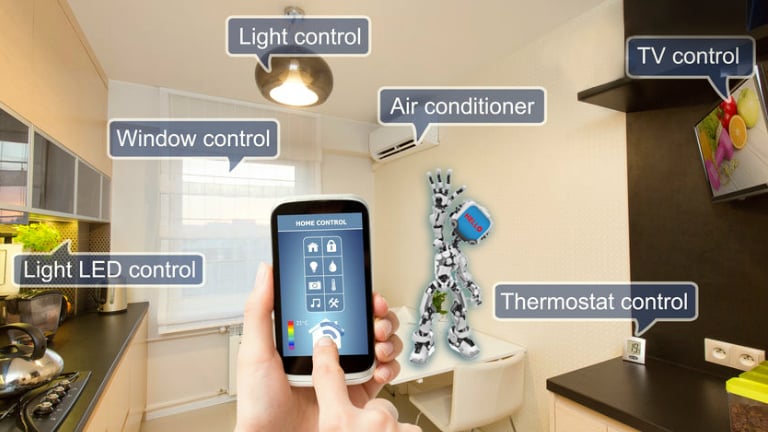SCC - Home Automation
انترنيت الاشياء واتمتة المنازل
EMAIL: automation@SCC-ME.COM
What Is a Home Automation?
Home Automation gives you access to control devices in your home from a mobile device anywhere in the world. The term may be used for isolated programmable devices, like thermostats and sprinkler systems, but home automation more accurately describes homes in which nearly everything — lights, appliances, electrical outlets, heating and cooling systems — are hooked up to a remotely controllable network.
From a home security perspective, this also includes your alarm system, and all of the doors, windows, locks, smoke detectors, surveillance cameras and any other sensors that are linked to it.
WHO WE ARE
With our Partner (Golden House LLC), we are passionate about bringing a custom technology experience to your residential and commercial lifestyles. We specialize in home and business automation through smart technology solutions that make your space connected, intuitive and safe. By combining our unrivaled design and installation expertise, customer focused approach, and high quality product offerings and services, we make it easy for you to experience all the benefits of custom technology solutions in your home or business.
OUR MISSION
We believe technology is more than installing gadgets in your home or business. It is about discovering a personalized solution that operates seamlessly and leaves a lasting impression. We are committed to making the world of custom technology and automation easy to understand, navigate and affordable for our customers. Our professional design and installation staff will exceed your expectations by delivering easy-to-use system options that fit your vision, with exceptional performance and long lasting support.
KEY TAKEAWAYS
A smart home allows homeowners to control appliances,thermostats, lights, and other devices remotely using a Smartphone or tablet through an internet connection.
Smart homes can be set up through wireless or hardwired systems.
Smart home technology provides homeowners with convenience and cost savings.
Security risks and bugs continue to plague makers and users of smart home technology.
How Smart Homes Work
A smart home’s devices are connected with each other and can be accessed through one central point—a Smartphone, tablet, laptop, or game console. Door locks, televisions, thermostats, home monitors, cameras, lights, and even appliances such as the refrigerator can be controlled through one home automation system. The system is installed on a mobile or other networked device, and the user can create time schedules for certain changes to take effect.
Smart home appliances come with self-learning skills so they can learn the homeowner’s schedules and make adjustments as needed. Smart homes enabled with lighting control allow homeowners to reduce electricity use and benefit from energy-related cost savings. Some home automation systems alert the homeowner if any motion is detected in the home when they're away, while others can call the authorities—police or the fire department—in case of imminent situations. Once connected, services such as a smart doorbell, smart security system, and smart appliances are all part of the internet of things (IoT) technology, a network of physical objects that can gather and share electronic information.
Security and efficiency are the main reasons behind the increase in smart home technology use.
Smart homes can feature either wireless or hardwired systems—or both. Wireless systems are easier to install. Putting in a wireless home automation system with features such as smart lighting, climate control, and security can cost several thousand dollars, making it very cost-friendly. Hardwired systems, on the other hand, are considered more reliable and are typically more difficult to hack. A hardwired system can increase the resale value of a home. But there is a drawback—it's fairly expensive. Installing a luxury and hardwired smart system can cost homeowners tens of thousands of dollars.
The global home automation market was valued at about $24 billion in 2016. That figure is expected to grow as more people begin to adopt smart home technology to the tune of about $53.5 billion by 2022. Video entertainment is expected to be the largest component of smart home technology, followed by home security and monitoring services. Smart speaker technology has already successfully penetrated the U.S. market, where roughly 31% of households use a device like the Amazon Echo or Google Nest.
Advantages of Smart Homes
Increase in convenience
Full control over all smart appliances with only one device
Time savings
Higher quality of life
Notifications in case of trouble
Good tool to let people in from remote
Energy savings
Cost savings in the long run
Smart homes can be customized to your needs
Safety improvements compared to conventional locks
Insurance benefits
Government subsidies and tax benefits for going green
support for the older generation
Smart homes may be suitable for disabled persons
Resale value might increase
May be fun for children to play around




